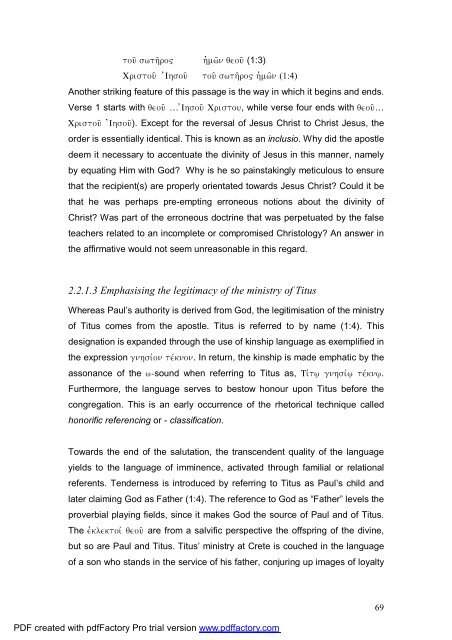A Text centred rhetorical analysis of Paul's Letter to Titus
A Text centred rhetorical analysis of Paul's Letter to Titus
A Text centred rhetorical analysis of Paul's Letter to Titus
You also want an ePaper? Increase the reach of your titles
YUMPU automatically turns print PDFs into web optimized ePapers that Google loves.
<strong>to</strong>u` swth`ro" hJmw`n qeou' (1:3)<br />
Cris<strong>to</strong>u' jIhsou` <strong>to</strong>u` swth`ro" hJmw`n (1:4)<br />
Another striking feature <strong>of</strong> this passage is the way in which it begins and ends.<br />
Verse 1 starts with qeou` … jIhsou` Cris<strong>to</strong>u, while verse four ends with qeou'…<br />
Cris<strong>to</strong>u` jIhsou'). Except for the reversal <strong>of</strong> Jesus Christ <strong>to</strong> Christ Jesus, the<br />
order is essentially identical. This is known as an inclusio. Why did the apostle<br />
deem it necessary <strong>to</strong> accentuate the divinity <strong>of</strong> Jesus in this manner, namely<br />
by equating Him with God? Why is he so painstakingly meticulous <strong>to</strong> ensure<br />
that the recipient(s) are properly orientated <strong>to</strong>wards Jesus Christ? Could it be<br />
that he was perhaps pre-empting erroneous notions about the divinity <strong>of</strong><br />
Christ? Was part <strong>of</strong> the erroneous doctrine that was perpetuated by the false<br />
teachers related <strong>to</strong> an incomplete or compromised Chris<strong>to</strong>logy? An answer in<br />
the affirmative would not seem unreasonable in this regard.<br />
2.2.1.3 Emphasising the legitimacy <strong>of</strong> the ministry <strong>of</strong> <strong>Titus</strong><br />
Whereas Paul’s authority is derived from God, the legitimisation <strong>of</strong> the ministry<br />
<strong>of</strong> <strong>Titus</strong> comes from the apostle. <strong>Titus</strong> is referred <strong>to</strong> by name (1:4). This<br />
designation is expanded through the use <strong>of</strong> kinship language as exemplified in<br />
the expression gnhsivon tevknon. In return, the kinship is made emphatic by the<br />
assonance <strong>of</strong> the w-sound when referring <strong>to</strong> <strong>Titus</strong> as, Tivtw/ gnhsivw/ tevknw/.<br />
Furthermore, the language serves <strong>to</strong> bes<strong>to</strong>w honour upon <strong>Titus</strong> before the<br />
congregation. This is an early occurrence <strong>of</strong> the <strong>rhe<strong>to</strong>rical</strong> technique called<br />
honorific referencing or - classification.<br />
Towards the end <strong>of</strong> the salutation, the transcendent quality <strong>of</strong> the language<br />
yields <strong>to</strong> the language <strong>of</strong> imminence, activated through familial or relational<br />
referents. Tenderness is introduced by referring <strong>to</strong> <strong>Titus</strong> as Paul’s child and<br />
later claiming God as Father (1:4). The reference <strong>to</strong> God as “Father” levels the<br />
proverbial playing fields, since it makes God the source <strong>of</strong> Paul and <strong>of</strong> <strong>Titus</strong>.<br />
The ejklek<strong>to</strong>iv qeou' are from a salvific perspective the <strong>of</strong>fspring <strong>of</strong> the divine,<br />
but so are Paul and <strong>Titus</strong>. <strong>Titus</strong>’ ministry at Crete is couched in the language<br />
<strong>of</strong> a son who stands in the service <strong>of</strong> his father, conjuring up images <strong>of</strong> loyalty<br />
PDF created with pdfFac<strong>to</strong>ry Pro trial version www.pdffac<strong>to</strong>ry.com<br />
69

















